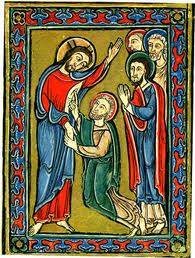Confession is an intriguing mystery to many people, myself included, even though I hear a great many of them. Returning to full time pastoral ministry, I am now in a parish of more than twelve thousand people. Contrary to many places, there’s no shortage of penitents. My pastor and I each hear four hours of confessions weekly, up to eight hours during Lent.
Sixty percent of the parish was born in Mexico or Guatemala, which explains part of my mystery. I wouldn’t say that I speak Spanish, though I hear many confessions in the language. That leaves me both befuddled and enormously popular as a confessor. To be honest, I don’t always know the precise details of what is being confessed, though it’s easy enough to hear the sorrow, even in another language.
The second source of mystery is the current rite. In thirty years as a priest, I’ve never seen it celebrated as composed by the liturgical architects of the Second Vatican Council. Did you know, “Bless me, Father” isn’t the way the rite reads? And many folks can no longer recite an Act of Contrition from memory. Fortunately, most places are ready to hand the penitent a card, ours in English and Spanish.
Indeed, the challenge of hearing confessions today is not knowing what to expect. Some people greet you; others race into their routine. Some are behind the screen; some in front of you. Some are there for the very first time; others haven’t been there in a long time. Hearing confessions today is akin to an ecclesial triage. You respond to whatever presents.
So I wasn’t surprised when a young boy recently came to confession a little awkwardly. Trying to be helpful, I asked, “Is this your first confession?” “Oh no, Father. This is my second. My first was at Christmas.” He did a fine job, having clearly thought about what he wanted to confess. A moment later, he was back with an even younger boy. “This is my brother, Father. He wants to confess.”
As I’ve explained, no one knows what to expect in confession these days, so it didn’t surprise me that, unlike his brother, this lad didn’t even seem to know if this was his first confession or how long it had been since his last. He simply explained what passed for sin in his life, and it wasn’t until we arrived at a penance and an act of contrition that I realized that I had just heard the confession of someone who had never been prepared for the sacrament. As far as I can tell, his older brother had simply decided that, if Jesus was there, forgiving sins, he ought to bring in his little brother as well. Why be stingy with divine mercy? I’m not sure who is more to be admired: the older brother, who wanted to share, or the younger, who trusted so explicitly.
There are two important lessons to be learned in the Easter confession of Saint Thomas. First, contrary to what many suppose, the disciples were not predisposed to believe that Christ rose from the dead. This is worth noting, as some think to explain away the resurrection as an example of grief, creating its own solace. On the contrary, Saint Thomas clearly displays the very attitude that the gospels assign collectively to all the disciples, which is initial incredulity. Whatever happened, these were not grieving folk who wished Jesus back to life. In fact, each evangelist stresses that the disciples weren’t ready for resurrection. They had to be won over by the wonderful. So Thomas’ response isn’t essentially different from that of the others, only delayed.
Secondly, should he be called Doubting Thomas, when his faith is only delayed, not denied? What seems to separate all of the Easter disciples from the rest of Judea isn’t an expectation that Jesus would rise from the dead so much as a willingness to accept the incomprehensible when it did happen. Put another way, their faith in Christ didn’t create resurrection. Resurrection created their faith, which suggests that others might also have believed, if the grace of spiritual suppleness had been given to them.
That brings us round to ourselves. Like Thomas, we must begin with the report of others, but what happens after that entirely depends upon our interior openness. To borrow from Saint Augustine, “Understanding is the reward of faith. Therefore, seek not to understand that you may believe, but believe that you may understand.” Without an openness to accept the extraordinary when it does manifest itself, you will never see anything but the ordinary.
Thomas wouldn’t ride on the shoulders of the others. He had to see for himself, yet something within him was also disposed to perceive and receive. On this Second Sunday of Easter, perhaps I can report a disposition, a suppleness, greater than that of Thomas: an older brother, who, like the first disciples, was determined to share his faith, and a little brother, who was so disposed to trust, he simply got in line for his dollop of Divine Mercy.
Acts 2: 42-47 1 Peter 1: 3-9 John 20: 19-31








